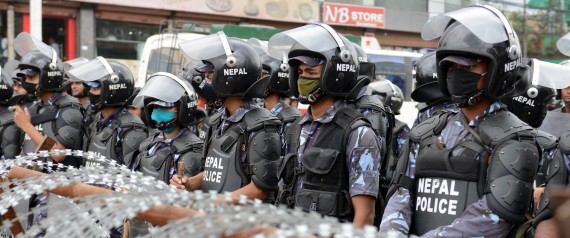Why The Kailali 'Protest' Was An Act Of Terror
On 24 August, the violent protests in Kailali, Nepal, resulted in the killings of at least seven security personnel (the number was as high as 20 according to other reports) and one is known to have been burned to death. I find myself asking, was this not an act of terrorism?
In any other part of the world, if police officers were hacked to death, the consequences would be serious and protests and prayers for peace would immediately follow. Look at the United States for instance: protests against the police are not uncommon. Yet, the killing of a police officer cannot be excused or ignored. I think a lot of us Nepali people, particularly those entrenched in a public role like journalists, politicians and academics hesitate to use the word terrorist in Nepal's context and herein lies a big problem.
I worry: doesn't ignoring terrorism have serious consequences? Would it not encourage other attacks? If we turn a blind eye to labelling what is right and wrong -- of course it's not always black and white -- aren't we allowing and often giving a green light to such acts of terror? Doesn't it strain the country's moral fibre?
"[W]e need to start being tougher about what is terrorism and what is not. We cannot keep allowing Nepal bandhs to happen because we label them as 'clashes of ethnic groups'..."
I understand the hesitation. I have it too. After the 13-year prolonged conflict in Nepal that led tomore than 16,000 deaths and robbed many families of their loved ones, and promoted the men who instigated the conflict to the post of prime ministers, it is difficult to label terrorism. We think that using the word will breed conflict instead of resolving the situation.
Yet, today, I worry about the country's moral fibre.
Only a couple of months ago, on 26 April, a 7.9 Richter scale earthquake brought people of all walks of life together, many who posted on Facebook that they would never throw a stone at another police officer because at times of crisis they are the ones who are most useful (a widely shared meme). These police officers restored order immediately, set up online accounts and responded to crisis so quickly that many like me sitting on my computer screen, scouring twitter, felt comfortable tweeting at the police with a traffic problem or a state of emergency -- all of which they responded to immediately. The photos of these men and women outfitted in their blue and grey uniforms, hosting self-defence, and music therapy while rescuing people appeared in national and international media. Even extremists like CK Raut showed a speck of humanity, fundraising for the victims of the earthquake and organising donation camps.
And yet today, when something so inhumane and cruel has happened to them, very few of us are willing to talk of this as an act of terrorism. A police officer was torched alive, a two year old child was killed, and yet we hesitate. We would rather use labels like "violence bred by conflict" and "clashes caused by ethnic tension". Even politicians, who condemned the death of known criminal Ghaite last week are silent when it comes to this act of terrorism.
"When a politician promotes a bandh, itis an act of terror. When a police officer is killed, it is an act of terror."
I think we need to start being tougher about what is terrorism and what is not. We cannot keep allowing Nepal bandhs to happen because we label them as "clashes of ethnic groups" or because there is no other way our politicians will listen. When a politician promotes a bandh, it isan act of terror. When a police officer is killed, itis an act of terror.
My request to use this term without fear is especially for journalists who report on these instances of conflict. It is only when we openly use these terms that we can plan the consequences of terror. Lawmakers can work on punishment, police can work on action, and citizens can work on response. When politicians face the consequences of igniting terror, perhaps they too will stop taking the route of Nepal bandhs and violent protests.
What is terrorism after all? It is the use of violence and intimidation in pursuit of political goals. Let us not forget its definition in our quest for peace.
http://www.huffingtonpost.in/shiwani-neupane/kailali-protest-act-of-te_1_b_8035236.html

